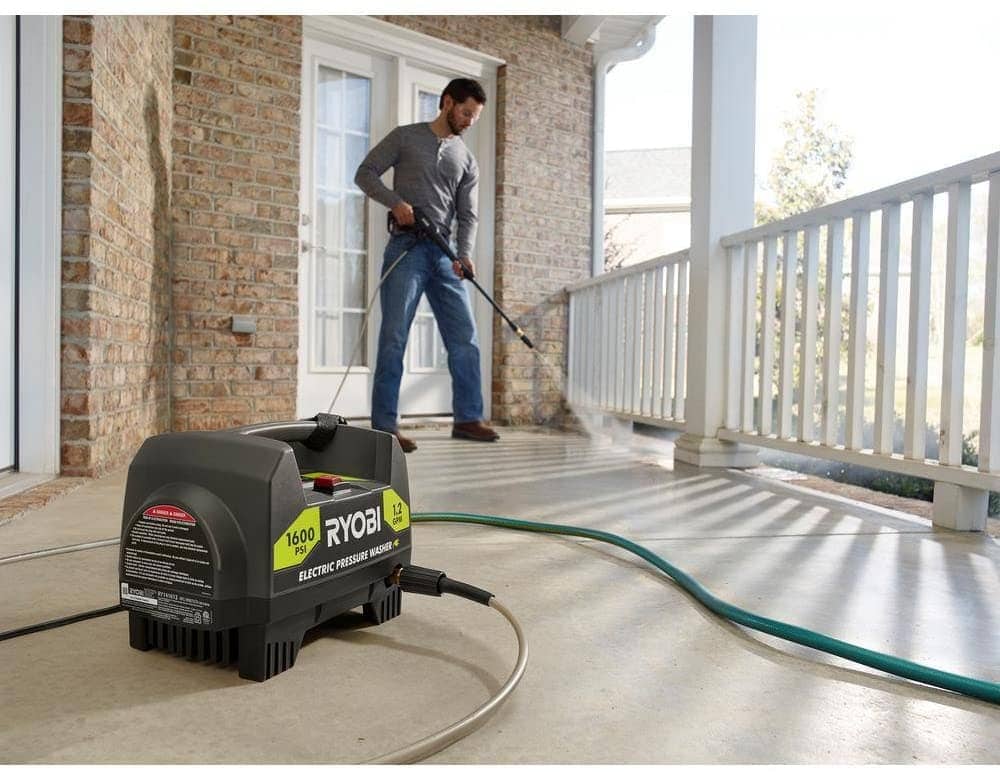Electric vs. Gas Pressure Washer: Which One To Choose?
-
Pete Ortiz
- Last updated:

Here’s an open secret: there is nothing quite as satisfying as using a pressure washer.
When you’ve got a dirty car, sidewalk, or wall, a pressure washer can make it look brand new. And these washers are even handy at cleaning grills, patios, and bikes.
Pressure washers do their job so well because they are high-powered. When you’re packing anywhere between 1,000 and 4,000 PSI (pounds per square inch), you can accomplish things that a simple water hose never could.
If you’re interested in buying a pressure washer, though, you must make an important choice: electric or gas pressure washer? Each type of washer has its own benefits and drawbacks, and which choice is best will come down to your own needs and preferences.
Keep reading to discover everything you need to know to make your selection!
Electric Pressure Washer Overview
The primary feature of an electric pressure washer is that it is powered by electricity instead of by gasoline. And this is the cause of the electric washer’s biggest benefits and biggest drawbacks.
Ease of Use
Electric pressure washers are far more user-friendly than gas pressure washers are. That’s because there is no real maintenance required: you simply plug it in, use it, and unplug it. Compared to the oil and gas maintenance on a gas pressure washer, it doesn’t get much easier than this.
On top of that, the electric washers are also easier to use than gas pressure washers. They are lightweight enough to carry just about anywhere. And they won’t make your wallet lightweight because electric washers are far cheaper than gas washers.
Limitations & Durability
However, there are some downsides you should be aware of. While electric pressure washers are lighter in weight, they still need to be plugged into work. That will limit where and how you use the washer and may require that you buy and store plenty of extension cords.
These washers are also light in weight because they are made of cheaper materials like plastic. This means they are prone to break and won’t last nearly as long as a gas pressure washer. And these washers usually can’t reach higher than 2,000 PSI, which is fine for simpler and smaller tasks. But gas pressure washers can easily provide twice the power.
- Lightweight
- Low maintenance
- Low cost
- Not durable
- Low power
- Must be plugged in at all times
Gas Pressure Washer Overview
Gas pressure washers are, of course, powered by gasoline. And compared to their less expensive electric cousins, gas washers are a real investment.
Portability
Because these washers don’t have to be plugged in, they pretty much redefine portability. It’s true that they are heavier than electric washers, but wheels can mitigate this issue. At the same time, though, you can literally take them anywhere. Compare that to electric washers that only work when you can reach a plug.
Power
Gas pressure washers are also much more powerful than electric washers. The average gas washer PSI is 2800, and they can reach as high as 4,000. Compare that to electric washers, which have an average PSI of 1500 and max out at around 2,000 PSI. This allows you to take on major projects rather than limiting yourself to small washing jobs.
Limitations & Price
As great as gas pressure washers are, though, they have their own drawbacks. To start with, they tend to be more expensive than electric washers. And while a gas washer will last longer than an electric washer, you should factor in the higher cost before you make a purchase.
Gas washers also require more maintenance. You will need to store and change out gas and oil on a regular basis, which creates ongoing costs and ongoing maintenance issues. Meanwhile, if you live in a cold climate and don’t plan to use your washer during the winter months, you’ll need to winterize the unit. Check out our comprehensive guide to winterizing your pressure washer.
Finally, the extreme power of gas pressure washers can be a bad thing. High pressure water on your skin may cause serious injuries. And high-pressure water on things like rock and wood may create small projectiles of debris that could cause injuries and damage.
- Powerful pressure
- Long-lasting
- Extreme portability
- High maintenance
- More expensive
- May cause injuries
What Kind of Washer Do I Need?
Now we come to the big question: what kind of washer do you need? This all comes down to why you want a pressure washer and what kind of handyman you are.
Electric washers are great for smaller projects around the house where you have easy access to an outlet. And they are a perfect choice for anyone who doesn’t like to perform a lot of maintenance on their machinery.
Gas washers, meanwhile, are meant for more intense projects and more experienced handymen. As long as you don’t mind changing out the oil and the gas, these washers will last a long time. And you can take them far beyond the house whenever you need to, which is perfect if you often help friends and family with projects.
Final Thoughts
At the end of the day, electric pressure washers and gas pressure washers each have their own set of benefits and drawbacks. No washer is perfect, but understanding what the washers are all about can help you make a purchase. Now that you know what these benefits and drawbacks are, you can make the choice that is best for you, your family, and your home.
Regardless of the pressure washer you choose, make sure to follow all safety precautions so you can avoid any injuries or accidents. And store your washer in a safe and secure place so that it’s in perfect condition next time you need to get your “clean” on!
Featured Image Credit: Pikrepo
Contents





